The Indian justice took palpable pleasure in suggesting the hypocrisy of the victors’ case. He quoted England’s prestigious Royal Institute of International Affairs at some length, for example, on how the Japanese had followed the precedents of European imperialism, sometimes “with almost pedantic exactitude.” Similarly, in discussing the “Amau Doctrine” of 1934, in which Japan had enunciated its special rights and interests in China, Pal observed that this definition of national interest “finds obvious precedent in the conduct of the United States in pursuance of the Monroe Doctrine.”69 The
...more
Welcome back. Just a moment while we sign you in to your Goodreads account.


